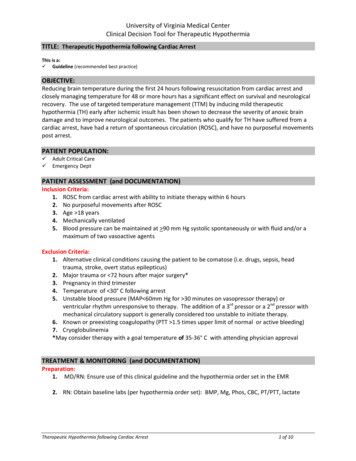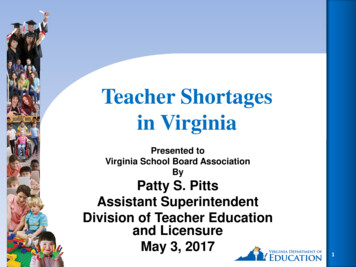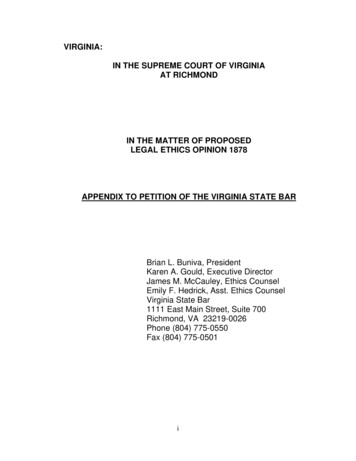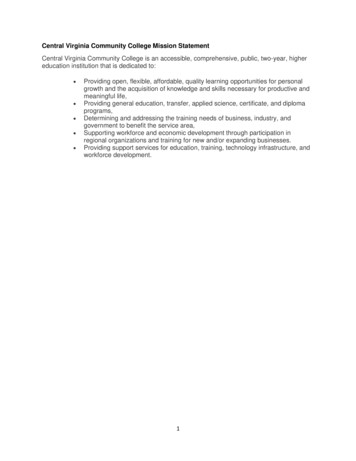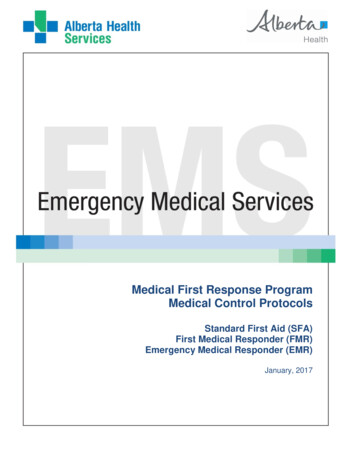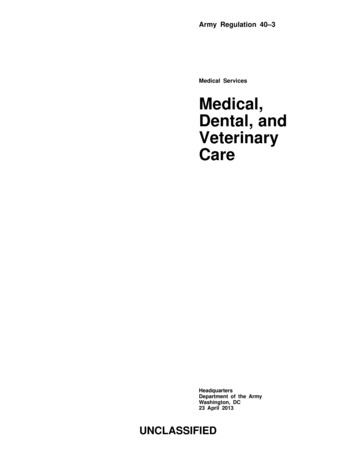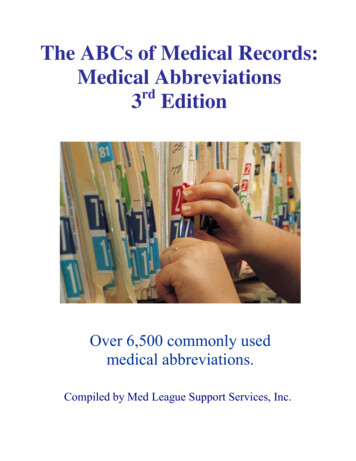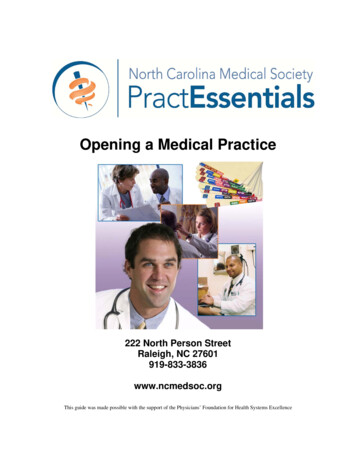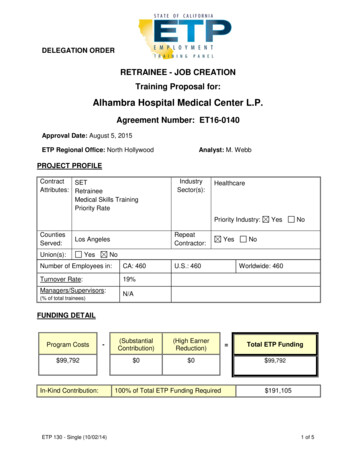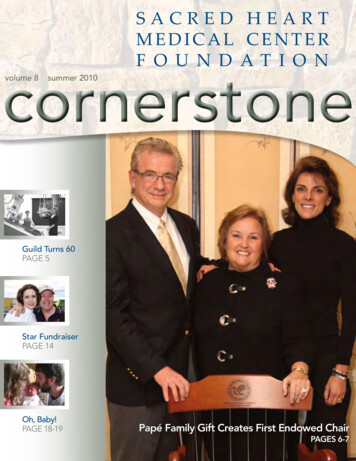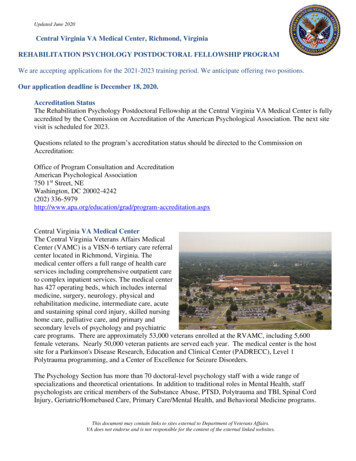
Transcription
Updated June 2020Central Virginia VA Medical Center, Richmond, VirginiaREHABILITATION PSYCHOLOGY POSTDOCTORAL FELLOWSHIP PROGRAMWe are accepting applications for the 2021-2023 training period. We anticipate offering two positions.Our application deadline is December 18, 2020.Accreditation StatusThe Rehabilitation Psychology Postdoctoral Fellowship at the Central Virginia VA Medical Center is fullyaccredited by the Commission on Accreditation of the American Psychological Association. The next sitevisit is scheduled for 2023.Questions related to the program’s accreditation status should be directed to the Commission onAccreditation:Office of Program Consultation and AccreditationAmerican Psychological Association750 1st Street, NEWashington, DC 20002-4242(202) accreditation.aspxCentral Virginia VA Medical CenterThe Central Virginia Veterans Affairs MedicalCenter (VAMC) is a VISN-6 tertiary care referralcenter located in Richmond, Virginia. Themedical center offers a full range of health careservices including comprehensive outpatient careto complex inpatient services. The medical centerhas 427 operating beds, which includes internalmedicine, surgery, neurology, physical andrehabilitation medicine, intermediate care, acuteand sustaining spinal cord injury, skilled nursinghome care, palliative care, and primary andsecondary levels of psychology and psychiatriccare programs. There are approximately 53,000 veterans enrolled at the RVAMC, including 5,600female veterans. Nearly 50,000 veteran patients are served each year. The medical center is the hostsite for a Parkinson's Disease Research, Education and Clinical Center (PADRECC), Level 1Polytrauma programming, and a Center of Excellence for Seizure Disorders.The Psychology Section has more than 70 doctoral-level psychology staff with a wide range ofspecializations and theoretical orientations. In addition to traditional roles in Mental Health, staffpsychologists are critical members of the Substance Abuse, PTSD, Polytrauma and TBI, Spinal CordInjury, Geriatric/Homebased Care, Primary Care/Mental Health, and Behavioral Medicine programs.This document may contain links to sites external to Department of Veterans Affairs.VA does not endorse and is not responsible for the content of the external linked websites.
Our training program includes predoctoral practicum students, an APA-accredited predoctoralpsychology internship program, and two postdoctoral fellowship programs.The Central Virginia Veterans Affairs Medical Center (VAMC) enjoys a strong and mutually beneficialaffiliation with the Medical College of Virginia, Virginia Commonwealth University (MCV/VCU).Residency and fellowship programs exist in virtually every general and specialty areas of internalmedicine, rehabilitation, surgery, psychiatry, psychology, and dentistry. Historically, RehabilitationPsychology fellows are provided VCU faculty appointments because of their role in training andsupervising students.Polytrauma and Traumatic Brain InjuryThe medical center acts as a tertiary care referral center for polytrauma and traumatic brain injury, andhas the following programs offers the full spectrum of services available through the Polytrauma Systemof Care (PSC).Polytrauma programs are accredited by the Commission on Accreditation of Rehabilitation Facilities(CARF). These programs provide interdisciplinary rehabilitation for individuals presenting with generalrehabilitation needs, as well as those presenting with complex physical, cognitive, and mental healthsequelae of severe and disabling injuries. These programs serve active duty service members and veteransreferred from military treatment facilities, other Department of Veterans Affairs hospitals, and civilianhospitals.Training Philosophy and ModelOur program is built upon a scientist-practitioner model of training. We support the view that goodclinical practice is based upon the science of psychology. The science of psychology is informed by theexperience of working with a variety of patients and supervisors and professionals from otherdisciplines. Our approach to training encourages clinical practice that is evidence-based and integratesthe current state of scientific knowledge with the complexities of individual patients. In essence, weemphasize training as a process of learning techniques which prepare trainees to make a laboratory oftheir applied setting. While trainees may ultimately develop careers that favor one aspect of the modelmore than the other, our expectation is that clinicians will practice from a scientific basis with clinicalsensibility. Fellows spend 25% of their time engaged in research activities and are encouraged toparticipate in ongoing scholarly opportunities such as journal clubs.Rehabilitation psychologists treat and study psychological problems in a variety of social, cultural, andtreatment settings. We see awareness of and sensitivity to cultural and diversity issues as necessary forresponsible professional functioning. We incorporate diversity training and recognition of individuals’unique cultural contexts into all aspects of our program, from supervision to didactics and journal clubs.Understanding how these factors interact to influence a patient's desired outcomes is a critical ability forrehabilitation psychologists. Thus, our training focuses on fellows learning to assist patients in defininggoals and achieving optimal psychological, physical, and social functioning. Successful rehabilitationpsychology fellows demonstrate the ability to integrate best-practice approaches with unique patient careneeds and communicate these plans to patients and other professionals across populations, settings andproblem areas.Richmond VAMCJune 20202
Fellows receive specialty training with clinical populations including acquired brain injury and acuteneurologic disorders, spinal cord injury, severe physical trauma, complex medical conditions, andchronic conditions common in aging populations such as dementia and Parkinson’s disease.Program Aim and CompetenciesThe objective of this postdoctoral fellowship is to provide a unique, and relevant, scientist-practitionertraining experience in rehabilitation psychology, with special emphasis on polytrauma patients andfamilies. Rehabilitation psychologists treat and study recovery from injury, psychosocial adjustment todisability, and how individual characteristics and environmental factors interact to affect function indaily life. Training in rehabilitation psychology focuses on the practice of assisting individuals withdisabilities in achieving optimal psychological, physical, and social functioning. Rehabilitationpsychologists exhibit competencies in the following areas, consistent with the standards for boardcertification in Rehabilitation Psychology by the American Board of Professional Psychology (ABPPRP): assessment, intervention, consultation, consumer protection, supervision, and research.We believe that our graduating fellows should be able to provide competent assessment and appropriateinterventions, consultation, and supervision in rehabilitation psychology at a level of independentpractice (not requiring supervision), as well as exhibit behavior that is consistent with professionalstandards. Graduating fellows should possess the requisite skills to bring research and clinicalliteratures to bear on their applied work and to communicate their own scholarly endeavors and intereststo other mental health practitioners.Expected training outcome: Our overarching aim is to prepare fellows for independent practice with atraining experience that meets the criteria to pursue board certification in rehabilitation psychology. Thefellowship prepares its graduates to become licensed clinical psychologists. Graduates will also beprepared for employment providing direct patient care and/or engaged in program evaluation andimprovement in health care settings. Training is consistent with the competencies outlined by ABRP(American Board of Rehabilitation Psychology) and fellows are encouraged to pursue BoardCertification as a Rehabilitation Psychologist (ABPP) after graduation. Subsumed under thisoverarching goal are the following training competencies: Competency 1: Fellows will develop advanced independent practitioner competence as rehabilitationpsychologists.Objectives for Competency 1: To ensure fellows have the knowledge and skills necessary tofunction independently as a rehabilitation psychologist. Fellows should demonstrate advancedpractice competence in the areas of ethics and applicable state/federal regulatory provisions,consultation and supervision, professional interpersonal interaction, responsibility and selfdirection, positive coping strategies, professional identification as a rehabilitation psychologist,an understanding and respect for cultural and other differences, and time management skills. Competency 2: Fellows will be competent in specified psychological and neuropsychologicalassessments.Objectives for Competency 2: To ensure fellows develop interview, chart review and assessmentinstrument selection skills (including use of objective, self-report, structured interview andneuropsychological screening instruments); to develop fellows’ ability to formulate accuratedifferential diagnoses; to develop fellows’ ability to generate integrated treatment plans andRichmond VAMCJune 20203
recommendations which reflect the interdisciplinary needs of patients; to provide clear andconcise feedback (verbal and written) to referral sources, other providers, patients and families. Competency 3: Fellows will be competent in specified psychological interventions.Objectives for Competency 3: Fellows will be able to formulate case conceptualizations,treatment goals, and choose and deliver appropriate interventions. Fellows will also seek outprofessional writings as necessary. Competency 4: Fellows will be competent professionals in providing consultation, supervision, andteaching.Objectives for Competency 4: Fellows will be able to effectively share their knowledge ofrehabilitation psychology with other healthcare professionals, other rehabilitation psychologists,and peers. Competency 5: Fellows will demonstrate professional behavior consistent with professional standardsand ethical guidelines.Objectives for Competency 5: Fellows will demonstrate actions consistent with an understandingof professional ethics, state laws of practice, laws related to and including the AmericanDisabilities Act (ADA), awareness and sensitivity to cultural and individual factors, and issuerelated to patient confidentiality and privacy. Competency 6: Fellows will be skilled in the interface between science and practice.Objectives for Competency 6: Fellows will demonstrate ability to apply scientific knowledge to thelocal clinical setting, be educated consumers of empirical research, and deliver empirically validatedtreatments. Fellows are expected to think critically, and to evaluate the findings of research-basedknowledge within the context of practical experiences.Program StructurePostdoctoral psychology fellows’ time is expected to be dedicated to clinical rotations (75%) andresearch (25%). Fellows are expected to remain on each rotation for six months, such that each fellowwill participate in four rotations during the two-year fellowship. Two of the rotations are required. Theother two six-month rotations will be selected collaboratively by the fellow and fellowship TrainingDirector. One may either be a repeat of one of the mandatory rotations (with the fellow addressingdifferent training goals and assuming more responsibility than in the first iteration) or a new optionalrotation (e.g., Health Psychology). Fellows also identify a research interest at the beginning of the firstyear of the fellowship. Fellows typically spend around 45 hours per week in training activities duringtheir fellowship.Richmond VAMCJune 20204
Training ExperiencesA Note About TeleworkThe Rehabilitation Psychology Postdoctoral Fellowship at the Central Virginia VAMC is dedicated toproviding fellows with outstanding clinical and research training while offering a rich array ofeducational activities. Should circumstances warrant fellows work from home, all clinical team meetingsand didactics will be available via online options. The VA offers a secure telehealth option for patients,VA Video Connect, which can also be used by fellows working remotely. Inpatient rotations may needto be modified to maintain the safety of both patients and providers. If telework is necessary, TrainingDirectors and rotation supervisors will work with fellows to modify their individual training plans tomaintain continuity of care for patients as well as continuity of training for fellows.Primary RotationsTBI and Polytrauma (Required): The Central Virginia VAMC acts as a tertiary care referral center forTBI and Polytrauma, and has the following programs, which offer rich opportunities for rehabilitationpsychology fellowship training:1. Polytrauma Rehabilitation Center (PRC): Fellows provide neuropsychological andrehabilitation psychology services to inpatients on the 16-bed, CARF-accredited acute inpatientbrain injury rehabilitation program. Richmond’s PRC is one of only five in the country. Thisprogram admits Veterans and Active Duty Service Members with acute injuries including TBI,stroke, brain tumor resection, and amputation. The PRC also admits patients with generalrehabilitation needs due to LVAD or organ transplants. These patients require a comprehensive,interdisciplinary rehabilitation program to optimally treat the complex medical, psychological,rehabilitation, and prosthetic needs of these individuals. Additionally, this unit houses anEpilepsy Monitoring Unit. Fellows will have the opportunity to work with patients with epilepticand non-epileptic seizures by providing neuropsychological assessment and brief, evidencebased intervention. Fellows participate in psychotherapeutic and behavioral interventions,neuropsychological evaluations, interdisciplinary rounds and meetings, and family conferences.Fellows participate in providing interventions to patients and family members, who often stay ina special residence on grounds for the duration of the inpatient rehabilitation stay.2. Polytrauma Transitional Rehabilitation Program (PTRP): Fellows provide neuropsychologicaland rehabilitation psychology services to inpatients in this 10-bed, CARF-accredited communityreintegration program. One of only five PTRPs in the country, this program providesrehabilitation services to Active Duty Service Members and Veterans recovering from traumaticand acquired brain injuries. Residents live and receive a variety of interdisciplinary therapies onsite and in the community with the goal of resuming independent living and participation inmeaningful roles and life activities. Fellows function as a member of the interdisciplinary team,participating in psychotherapeutic and behavioral interventions, neuropsychological evaluations,interdisciplinary treatment team meetings, and family conferences. Fellows may also have theopportunity to work in the Servicemember Transitional Advanced Rehabilitation (STAR)program. STAR is a 10-bed inpatient program focused on vocational rehabilitation.Richmond VAMCJune 20205
3. Polytrauma Network Site (PNS): Fellows provide a variety of psychological andneuropsychological services to outpatients in the polytrauma outpatient program includingcomprehensive neuropsychological evaluations, treatment planning, psychotherapy, familycounseling, suicide and violence risk assessment, and behavioral health and pain managementinterventions. PNS patients include a large percentage of OEF/OIF Veterans with complexneeds involving post-concussion syndrome (PCS), PTSD, and chronic pain. Fellows participateas part of an interdisciplinary outpatient team involving medical, rehabilitation, and mentalhealth providers assessing and treating PCS, PTSD, pain, and other comorbid problems.Spinal Cord Injury & Disorders (Required): The Central Virginia VAMC is one of 24 VAMC specialtycare centers for Spinal Cord Injury & Disorders. This 80-bed, CARF-accredited program providesfellows with knowledge, skills and abilities in the following areas: Understanding the basic physiologicchanges which occur with various levels and degrees of spinal cord injury and the physical medicine,pharmacological and adaptive/assistive equipment available; participating on an interdisciplinaryrehabilitation team; assessing personality, emotional, and cognitive functioning in relation to successfulparticipation in rehabilitation and psychosocial functioning post-discharge; providing individual, familyand group therapies to address psychosocial, sexual, vocational and pain problems arising from spinalcord injury; and understanding basic interventions to assist with adopting healthier lifestyles (e.g.,smoking cessation, substance use, weight management, recreational activities) in inpatient andoutpatient settings. Opportunities may also exist for fellows to gain experience working withindividuals diagnosed with neurodegenerative diseases including multiple sclerosis and amyotrophiclateral sclerosis, utilize telehealth and/or biofeedback, and participate in program development.Neuropsychology (Optional): Within the Outpatient Mental Health Clinic, fellows provideneuropsychological assessment services to a diverse range of patients who span the adult lifecycle.Fellows will enhance both brief and comprehensive neuropsychological evaluation and consultationskills while working with a wide variety of neurological and psychological disorders such as variousdementias, Parkinson's disease, stroke, MS, seizure disorders, TBI, and other dual-diagnosis referralcases. Based on the fellow’s career goals, and availability, there may be opportunities to focus onspecific sub-specialties (e.g., geriatric neuropsychology) and/or provide supervision to internship-leveltrainees.Health Psychology (Optional): The fellow will collaborate with the Training Director and the HealthPsychology supervisors to select one to two rotations as described below. Rotation matriculation andtiming will be based on trainee desire, as well as breadth and depth of training needs. Similarly, in theselection process, attention will be appropriately given to overarching program competencies and longterm fellow career goals.1. Weight Management: This rotation focuses on the psychological, social, and behavioral aspectsof weight management. It addresses many psychological dimensions related to weight includingbody image, health behaviors, eating disorders, substance use, co-morbid mental healthconditions, non-adherence to medical regimens, illness adjustment issues and social context. Thefollowing experiences are available: serve as a member of multiple interdisciplinary teamsrelated to weight management (MOVE! and Bariatric Surgery); assessment of patients beingconsidered for bariatric surgery or medical procedures; assessment of personality,psychopathology, and cognitive processes in relation to health problems; short-term individualpsychotherapy; and behavior management plans; co-lead MOVE! groups. Multiple treatmentRichmond VAMCJune 20206
interventions are used including Motivational Interviewing, CBT, ACT, DBT, Solution FocusedTherapy, and Problem Solving Therapy.2. Psycho-Oncology: This rotation focuses on the psychological, social, behavioral, existential andethical aspects of cancer care. It addresses two main psychological dimensions of cancer care.First, the psychological responses to cancer at all stages of the disease, including that of familiesand caretakers. Second, the psychological, behavioral and social factors that may affect thedisease process. Oncology is staffed by collaborative interdisciplinary teams (Medical Oncology,Radiation Oncology and Surgical On
The medical center acts as a tertiary care referral center for polytrauma and traumatic brain injury, and has the following programs offers the full spectrum of services available through the Polytrauma System of Care (PSC). Polytrauma programs are accredited by the Commission on Accreditat

